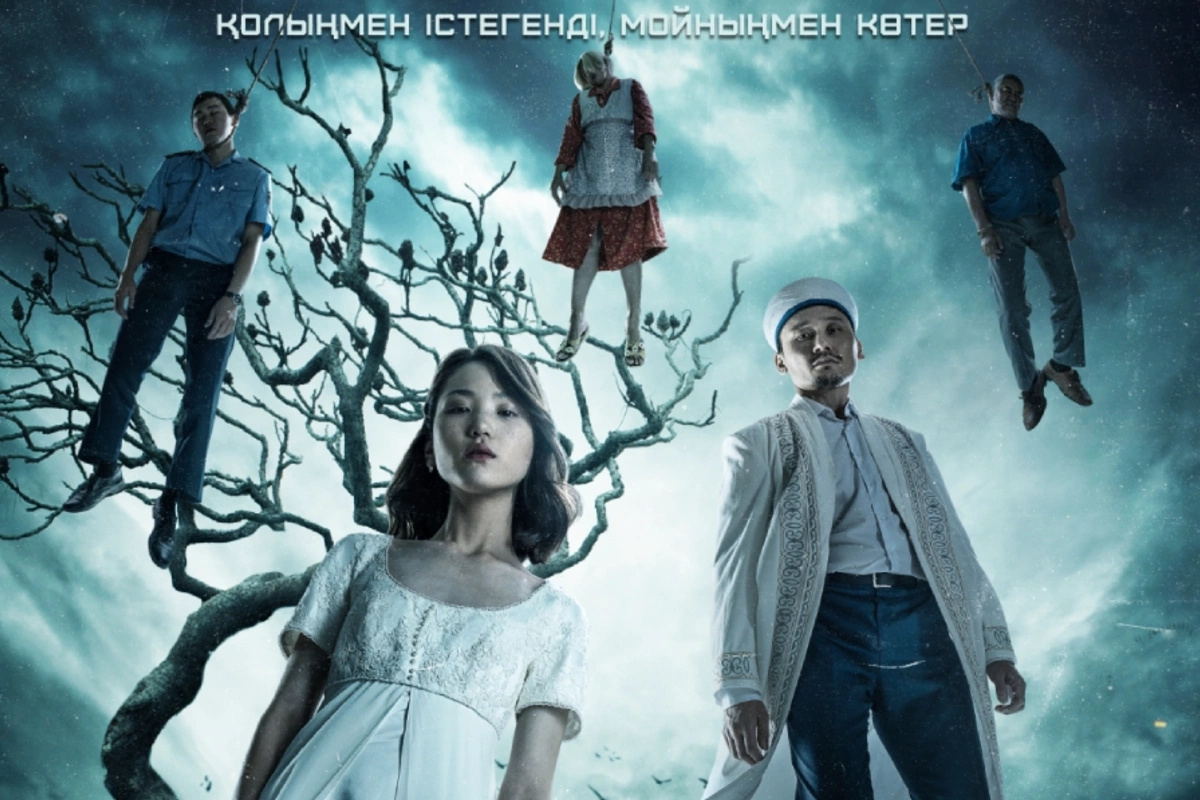
Dastur, which means tradition in Kazakh, grossed $2.2 million in the first week of its release.
Image: kino.kz
(Eurasianet) Political corruption, violence against women and the role of Islam in society do not sound like the obvious makings of a hit movie.
But a new release in Kazakhstan over the holiday season that blends the psycho horror genre with political and social commentary has become a surprise success with cinema-goers. It is usually only comedies that manage to draw these kinds of crowds.
Dastur, which means tradition in Kazakh, was directed by Kuanish Beisekov, and grossed 1 billion tenge, around $2.2 million, in the first week after its December 28 release. That is a record by Kazakh movie industry standards.
In the first four days after its release, up to New Year’s Eve, the Kazakh-language film was easily outgrossing Hollywood blockbusters showing at the same time, such as Aquaman and the Lost Kingdom or Ferrari.
The plot centers on the fallout after the local wild-child son of a rich businessman rapes Diana, a school-leaver walking home after performing on her dombyra, a Kazakh stringed instrument, at the “last bell” ceremony celebrating the end of the academic year.
Her family reports the crime to the police. But then social pressure kicks in. To paper over the scandal, the mayor brokers a deal for Diana to marry her rapist.
To do otherwise would bring uyat, or shame, on the girl and her family.
Uyat is more of a concept than a word. It is the cudgel often used in Central Asia to force women to conform to social expectations. It is referenced several times throughout the movie. And tellingly, the mothers in both families — that of the perpetrator and the victim — are eager to broker a deal rather than endure public embarrassment.
Diana, however, is unable to endure the trauma. At her own arranged wedding, she flees and tries to hang herself with a scarf.
As a form of dirty dowry, the victim’s family receives 20 million tenge (about $45,000) from the rapist’s father, the owner of a cattle ranch and the richest man in the village.
It is at this stage that the movie shifts gears into something spookier and fantastical. The birth of a two-headed calf, the mysterious slaughter of the ranch’s sheep, and an infestation of flies in the house, all of it unfolding to the haunting strains of a dombyra, inject a flavor of queasy unease.
The politics is never far away, however. Suspicions linger over the role of the mayor — an unmistakable nod to the type of corruption that permeates Kazakh society at all levels.
Audiences are clearly enthusiastic to see the work of movie-makers prepared to unflinchingly gaze at the country’s ailments, from political rot to violence against women, in all their grisly colors. At the showing of the movie attended by this reviewer, the audience greeted the finale with a round of applause.
The makers of Dastur are explicit about their goals. A message appearing onscreen at the end makes it clear that the theme of gender violence is front and center and then states that part of the box office proceeds will be given to women’s rights organizations and shelters.
The topic of gender-based violence is particularly resonant in Kazakhstan at the moment, following the killing in November of Saltanat Nukenova in a restaurant in Astana. Her husband Kuandyk Bishimbayev, a former government minister, is in jail awaiting trial for the murder, which dominated the headlines for weeks.
That the movie should tackle politics head-on came as no surprise either, since Beisekov, the director, is a former producer for Irina Kairatovna, a rock group known for its caustic political commentary.
At the height of the COVID-19 pandemic, the group released a hard-hitting

In Dastur, the lead character happens to be called Nursultan – a common enough name in Kazakhstan, but inextricably associated with a president whose rule is perceived as being characterized by the corruption and social injustice that the movie exposes.
His son, the rapist, is called Bolat, which, in what may or may not be another coincidence, is the name of Nazarbayev’s late brother.
Those are not the only monikers with connotations. The village is given the ironic name of Bolashak, Kazakh for future. The restaurant where the wedding party is held is called Khan Shatyr, the same as a flashy shopping mall in Astana. The mosque where the unhappy couple take their religious vows is called Nurly, meaning light, but also a sly nod to Nazarbayev’s first name.
The role of religion comes into play as the imam is called upon to exorcise the spirits that seem to be haunting the family. A scene invoking the spirit of 1973 classic The Exorcist plays out amid much drama.
No spoilers, but there is a twist. And as in life, it is probably best not to expect a happy ending.
Joanna Lillis is a journalist based in Almaty and author of Dark Shadows: Inside the Secret World of Kazakhstan.
Share on social media